Play video — original link
Play video
Play video
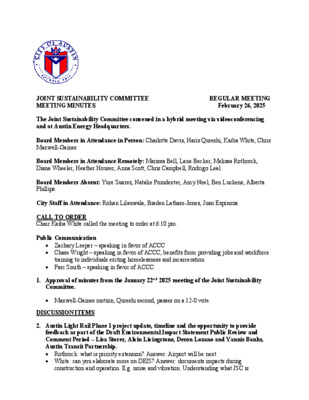
February 26, 2025 JOINT SUSTAINABILITY COMMITTEE REGULAR MEETING MEETING MINUTES The Joint Sustainability Committee convened in a hybrid meeting via videoconferencing and at Austin Energy Headquarters. Board Members in Attendance in Person: Charlotte Davis, Haris Qureshi, Kaiba White, Chris Maxwell-Gaines Board Members in Attendance Remotely: Marissa Bell, Lane Becker, Melissa Rothrock, Diana Wheeler, Heather Houser, Anna Scott, Chris Campbell, Rodrigo Leal Board Members Absent: Yure Suarez, Natalie Poindexter, Amy Noel, Ben Luckens, Alberta Phillips City Staff in Attendance: Rohan Lilauwala, Braden Latham-Jones, Juan Espinoza CALL TO ORDER Chair Kaiba White called the meeting to order at 6:10 pm. Public Communication • Zachary Leeper – speaking in favor of ACCC • Chase Wright – speaking in favor of ACCC, benefits from providing jobs and workforce training to individuals exiting homelessness and incarceration • Parc Smith – speaking in favor of ACCC 1. Approval of minutes from the January 22nd 2025 meeting of the Joint Sustainability Committee. DISCUSSION ITEMS • Maxwell-Gaines motion, Qureshi second, passes on a 12-0 vote. 2. Austin Light Rail Phase 1 project update, timeline and the opportunity to provide feedback as part of the Draft Environmental Impact Statement Public Review and Comment Period – Lisa Storer, Alvin Livingstone, Deron Lozano and Yannis Banks, Austin Transit Partnership. • Rothrock: what is priority extension? Answer: Airport will be next • White: can you elaborate more on DEIS? Answer: documents impacts during construction and operation. E.g. noise and vibration. Understanding what JSC is interested in is helpful. Federal gov’t doesn’t require level of detail being provided. E.g. working with city arborist to come up with tree preservation-first approach. • Model shows 20 million + VMT reduced. All electric vehicles. 3. Austin Civilian Conservation Corps Update on staffing, current agreements, pathways, and its future funding opportunities. – Juan Espinoza, Economic Development Department. • Davis: what happened to other pathways? Espinoza: funding shortfall meant that only natural systems pathway is active. Program has always been funded with one-time funding. • White: how much funding is needed to bring programming back? Espinoza: $2.8m at max capacity. 4. Comprehensive Climate Implementation Program Update – Braden Latham-Jones, Office of Climate Action and Resilience. • White: what about public-facing items? Latham-Jones – some items feature this. • White: will this come back to JSC? Latham-Jones: TBD, depends on timeline. 5. Recommendations and possible action on the Comprehensive Climate Implementation Program, including supportive action and/or recommendations for additions …
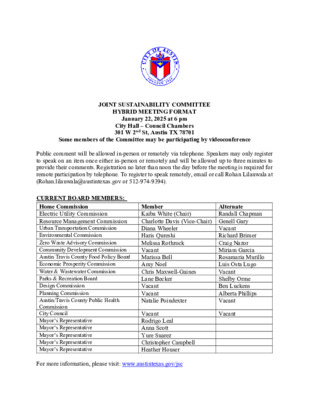
JOINT SUSTAINABILITY COMMITTEE HYBRID MEETING FORMAT January 22, 2025 at 6 pm City Hall – Council Chambers 301 W 2nd St, Austin TX 78701 Some members of the Committee may be participating by videoconference Public comment will be allowed in-person or remotely via telephone. Speakers may only register to speak on an item once either in-person or remotely and will be allowed up to three minutes to provide their comments. Registration no later than noon the day before the meeting is required for remote participation by telephone. To register to speak remotely, email or call Rohan Lilauwala at (Rohan.lilauwala@austintexas.gov or 512-974-9394). Alternate Randall Chapman Member Kaiba White (Chair) Charlotte Davis (Vice-Chair) Genell Gary Diana Wheeler Haris Qureshi Melissa Rothrock Vacant CURRENT BOARD MEMBERS: Home Commission Electric Utility Commission Resource Management Commission Urban Transportation Commission Environmental Commission Zero Waste Advisory Commission Community Development Commission Austin Travis County Food Policy Board Marissa Bell Economic Prosperity Commission Water & Wastewater Commission Parks & Recreation Board Design Commission Planning Commission Austin/Travis County Public Health Commission City Council Mayor’s Representative Mayor’s Representative Mayor’s Representative Mayor’s Representative Mayor’s Representative Amy Noel Chris Maxwell-Gaines Lane Becker Vacant Vacant Natalie Poindexter Vacant Rodrigo Leal Anna Scott Yure Suarez Christopher Campbell Heather Houser For more information, please visit: www.austintexas.gov/jsc Vacant Richard Brimer Craig Nazor Miriam Garcia Rosamaria Murillo Luis Osta Lugo Vacant Shelby Orme Ben Luckens Alberta Phillips Vacant Vacant Committee. DISCUSSION members. Budget. AGENDA CALL TO ORDER PUBLIC COMMUNICATION: GENERAL The first 10 speakers signed up prior to the meeting being called to order will each be allowed a three-minute allotment to address their concerns regarding items not posted on the agenda. APPROVAL OF MINUTES 1. Approval of minutes from the December 18th, 2024 meeting of the Joint Sustainability 2. Discussion of Joint Sustainability Committee membership, expiring terms, and replacement 3. Discussion of potential Joint Sustainability Committee Recommendations for the FY26 City 4. Update from Electric Utility Commission on Solar Programs – Kaiba White. 5. Update from Austin Travis County Food Policy Board on draft recommendations for consideration by the Joint Sustainability Committee – Marissa Bell. 6. Update from The Austin Travis County Public Health Commission on an approved recommendation to improve the supportive services provided to Community Health Workers – Natalie Poindexter. DISCUSSION AND ACTION ITEMS FUTURE AGENDA ITEMS ADJOURNMENT The City of Austin is committed to compliance with the American with Disabilities Act. Reasonable modifications and …
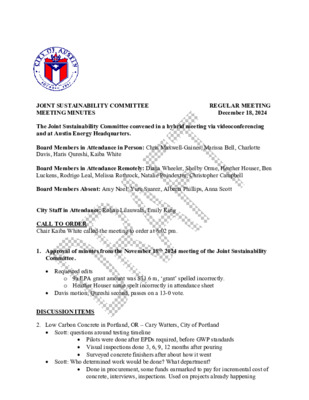
JOINT SUSTAINABILITY COMMITTEE REGULAR MEETING December 18, 2024 MEETING MINUTES The Joint Sustainability Committee convened in a hybrid meeting via videoconferencing and at Austin Energy Headquarters. Board Members in Attendance in Person: Chris Maxwell-Gaines, Marissa Bell, Charlotte Davis, Haris Qureshi, Kaiba White Board Members in Attendance Remotely: Diana Wheeler, Shelby Orme, Heather Houser, Ben Luckens, Rodrigo Leal, Melissa Rothrock, Natalie Poindexter, Christopher Campbell Board Members Absent: Amy Noel, Yure Suarez, Alberta Phillips, Anna Scott City Staff in Attendance: Rohan Lilauwala, Emily King CALL TO ORDER Chair Kaiba White called the meeting to order at 6:02 pm. 1. Approval of minutes from the November 18th, 2024 meeting of the Joint Sustainability Committee. • Requested edits DISCUSSION ITEMS o 9a EPA grant amount was $31.6 m, ‘grant’ spelled incorrectly. o Heather Houser name spelt incorrectly in attendance sheet • Davis motion, Qureshi second, passes on a 13-0 vote. 2. Low Carbon Concrete in Portland, OR – Cary Watters, City of Portland • Scott: questions around testing timeline • Pilots were done after EPDs required, before GWP standards • Visual inspections done 3, 6, 9, 12 months after pouring • Surveyed concrete finishers after about how it went • Scott: Who determined work would be done? What department? • Done in procurement, some funds earmarked to pay for incremental cost of concrete, interviews, inspections. Used on projects already happening (ramps, sidewalk sections, etc.). No exact amount, but estimate of only a few thousand dollars. • Portland has an internal materials testing lab performing QA testing on construction materials used by the city, this was part of regular workflow. • Scott: what were barriers? • Biggest: resistance from private suppliers. • Next steps: training, support at pre-bid meetings, reestablish conversation on how to expand program and lower GWP over time, slowly but surely. Also looking into expanding into materials like asphalt. 3. Austin’s Urban Forest – Emily King, Development Services Department • Davis: What is trend of tree removals vs canopy cover o Priorities in order: preserve trees on site, plant more trees on site, payments to mitigation fund, which supports Urban Forest Grant. o Supports community groups + additional trees in city projects • Have we estimated cost of achieving 50% tree canopy cover goal o Maintenance units are only funded to be able to do reactionary tree work, not on proactive maintenance plans. There is a maintenance gap. We don’t have a …
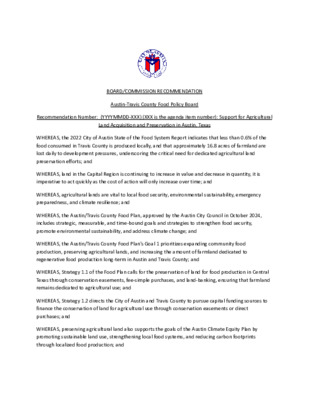
BOARD/COMMISSION RECOMMENDATION Austin-Travis County Food Policy Board Recommendation Number: (YYYYMMDD-XXX) (XXX is the agenda item number): Support for Agricultural Land Acquisition and Preservation in Austin, Texas WHEREAS, the 2022 City of Austin State of the Food System Report indicates that less than 0.6% of the food consumed in Travis County is produced locally, and that approximately 16.8 acres of farmland are lost daily to development pressures, underscoring the critical need for dedicated agricultural land preservation efforts; and WHEREAS, land in the Capital Region is continuing to increase in value and decrease in quantity, it is imperative to act quickly as the cost of action will only increase over time; and WHEREAS, agricultural lands are vital to local food security, environmental sustainability, emergency preparedness, and climate resilience; and WHEREAS, the Austin/Travis County Food Plan, approved by the Austin City Council in October 2024, includes strategic, measurable, and time-bound goals and strategies to strengthen food security, promote environmental sustainability, and address climate change; and WHEREAS, the Austin/Travis County Food Plan’s Goal 1 prioritizes expanding community food production, preserving agricultural lands, and increasing the amount of farmland dedicated to regenerative food production long-term in Austin and Travis County; and WHEREAS, Strategy 1.1 of the Food Plan calls for the preservation of land for food production in Central Texas through conservation easements, fee-simple purchases, and land-banking, ensuring that farmland remains dedicated to agricultural use; and WHEREAS, Strategy 1.2 directs the City of Austin and Travis County to pursue capital funding sources to finance the conservation of land for agricultural use through conservation easements or direct purchases; and WHEREAS, preserving agricultural land also supports the goals of the Austin Climate Equity Plan by promoting sustainable land use, strengthening local food systems, and reducing carbon footprints through localized food production; and WHEREAS, Natural Systems Goal 2 of the Austin Climate Equity Plan aims to protect 500,000 acres of farmland across the five-county region through legal conservation or regenerative agriculture programs by 2030; and WHEREAS, the City of Austin currently lacks a dedicated mechanism to effectively manage and prioritize the preservation of agricultural lands; WHEREAS, the Austin-Travis County Food Policy Board’s Recommendation Number 20240318-7 urged the City of Austin to allocate funds and create a full-time equivalent (FTE) position to support the implementation of the Food Plan; and NOW, THEREFORE, BE IT RESOLVED that the Austin-Travis County Food Policy Board encourages the Austin City Council to allocate …
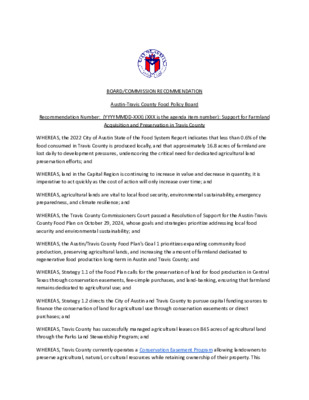
BOARD/COMMISSION RECOMMENDATION Austin-Travis County Food Policy Board Recommendation Number: (YYYYMMDD-XXX) (XXX is the agenda item number): Support for Farmland Acquisition and Preservation in Travis County WHEREAS, the 2022 City of Austin State of the Food System Report indicates that less than 0.6% of the food consumed in Travis County is produced locally, and that approximately 16.8 acres of farmland are lost daily to development pressures, underscoring the critical need for dedicated agricultural land preservation efforts; and WHEREAS, land in the Capital Region is continuing to increase in value and decrease in quantity, it is imperative to act quickly as the cost of action will only increase over time; and WHEREAS, agricultural lands are vital to local food security, environmental sustainability, emergency preparedness, and climate resilience; and WHEREAS, the Travis County Commissioners Court passed a Resolution of Support for the Austin-Travis County Food Plan on October 29, 2024, whose goals and strategies prioritize addressing local food security and environmental sustainability; and WHEREAS, the Austin/Travis County Food Plan’s Goal 1 prioritizes expanding community food production, preserving agricultural lands, and increasing the amount of farmland dedicated to regenerative food production long-term in Austin and Travis County; and WHEREAS, Strategy 1.1 of the Food Plan calls for the preservation of land for food production in Central Texas through conservation easements, fee-simple purchases, and land-banking, ensuring that farmland remains dedicated to agricultural use; and WHEREAS, Strategy 1.2 directs the City of Austin and Travis County to pursue capital funding sources to finance the conservation of land for agricultural use through conservation easements or direct purchases; and WHEREAS, Travis County has successfully managed agricultural leases on 845 acres of agricultural land through the Parks Land Stewardship Program; and WHEREAS, Travis County currently operates a Conservation Easement Program allowing landowners to preserve agricultural, natural, or cultural resources while retaining ownership of their property. This program, funded by voter-approved bond funds and supplemented by donations, has successfully preserved significant tracts of land and helps protect vital resources such as watersheds, wildlife habitats, and agricultural lands; and WHEREAS, the Conservation Easement Program has been a key tool for Travis County in its efforts to protect land from development, with more than $24.9 million approved by voters between 2011 and 2017 for the purchase of easements. The program prioritizes properties in conservation corridors and those with significant environmental or agricultural value, aligning with the broader goals of the Austin/Travis County …
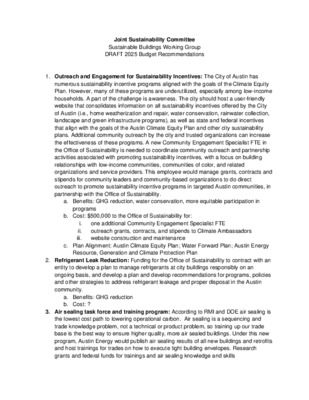
Joint Sustainability Committee Sustainable Buildings Working Group DRAFT 2025 Budget Recommendations 1. Outreach and Engagement for Sustainability Incentives: The City of Austin has numerous sustainability incentive programs aligned with the goals of the Climate Equity Plan. However, many of these programs are underutilized, especially among low-income households. A part of the challenge is awareness. The city should host a user-friendly website that consolidates information on all sustainability incentives offered by the City of Austin (i.e., home weatherization and repair, water conservation, rainwater collection, landscape and green infrastructure programs), as well as state and federal incentives that align with the goals of the Austin Climate Equity Plan and other city sustainability plans. Additional community outreach by the city and trusted organizations can increase the effectiveness of these programs. A new Community Engagement Specialist FTE in the Office of Sustainability is needed to coordinate community outreach and partnership activities associated with promoting sustainability incentives, with a focus on building relationships with low-income communities, communities of color, and related organizations and service providers. This employee would manage grants, contracts and stipends for community leaders and community-based organizations to do direct outreach to promote sustainability incentive programs in targeted Austin communities, in partnership with the Office of Sustainability. a. Benefits: GHG reduction, water conservation, more equitable participation in programs b. Cost: $500,000 to the Office of Sustainability for: one additional Community Engagement Specialist FTE outreach grants, contracts, and stipends to Climate Ambassadors i. ii. iii. website construction and maintenance c. Plan Alignment: Austin Climate Equity Plan; Water Forward Plan; Austin Energy Resource, Generation and Climate Protection Plan 2. Refrigerant Leak Reduction: Funding for the Office of Sustainability to contract with an entity to develop a plan to manage refrigerants at city buildings responsibly on an ongoing basis, and develop a plan and develop recommendations for programs, policies and other strategies to address refrigerant leakage and proper disposal in the Austin community. a. Benefits: GHG reduction b. Cost: ? 3. Air sealing task force and training program: According to RMI and DOE air sealing is the lowest cost path to lowering operational carbon. Air sealing is a sequencing and trade knowledge problem, not a technical or product problem, so training up our trade base is the best way to ensure higher quality, more air sealed buildings. Under this new program, Austin Energy would publish air sealing results of all new buildings and retrofits and host …
Play video
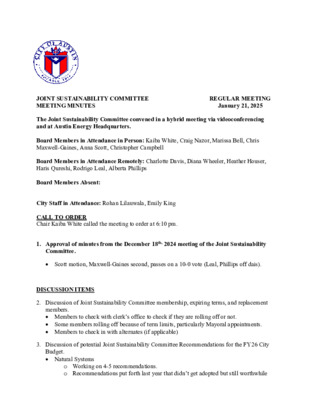
January 21, 2025 JOINT SUSTAINABILITY COMMITTEE REGULAR MEETING MEETING MINUTES The Joint Sustainability Committee convened in a hybrid meeting via videoconferencing and at Austin Energy Headquarters. Board Members in Attendance in Person: Kaiba White, Craig Nazor, Marissa Bell, Chris Maxwell-Gaines, Anna Scott, Christopher Campbell Board Members in Attendance Remotely: Charlotte Davis, Diana Wheeler, Heather Houser, Haris Qureshi, Rodrigo Leal, Alberta Phillips Board Members Absent: City Staff in Attendance: Rohan Lilauwala, Emily King CALL TO ORDER Chair Kaiba White called the meeting to order at 6:10 pm. 1. Approval of minutes from the December 18th, 2024 meeting of the Joint Sustainability Committee. • Scott motion, Maxwell-Gaines second, passes on a 10-0 vote (Leal, Phillips off dais). DISCUSSION ITEMS 2. Discussion of Joint Sustainability Committee membership, expiring terms, and replacement members. • Members to check with clerk’s office to check if they are rolling off or not. • Some members rolling off because of term limits, particularly Mayoral appointments. • Members to check in with alternates (if applicable) 3. Discussion of potential Joint Sustainability Committee Recommendations for the FY26 City Budget. • Natural Systems o Working on 4-5 recommendations. o Recommendations put forth last year that didn’t get adopted but still worthwhile o Items being discussed in the climate equity plan implementation o Converting impervious cover to functional green – audit of city owned land o Land acquisition, in eastern watersheds o Citywide green infrastructure vision, implementation strategy o Green workforce o Wildfire prevention o Tree canopy survey/assessment using LIDAR • Consumption o Looked at previous recommendations from 2024 and 2023. In 2023, 100% adoption. In 2024, near zero adoption. o Looking at reinstating the climate ambassador program o Citywide sustainable purchasing o Low carbon concrete o Food plan implementation o Zero waste and circular restaurant materials o Electric landscape equipment • Transportation still working • Buildings o Outreach/engagement for sustainability incentives o Refrigerants – reducing leaks, switching to different refrigerants o Air sealing task force o Water leak detection and landscape conversions o Sustainable construction procurement coordinator o ACCC support 4. Update from Electric Utility Commission on Solar Programs – Kaiba White • Update on solar standard offer, allows building owners to lease roof space to solar developers. First stakeholder meeting scheduled for expansion of program on Jan 29. • Solar for All moving slower because interlocal agreement with Harris County needed to be completed. 5. Update from Austin Travis County …